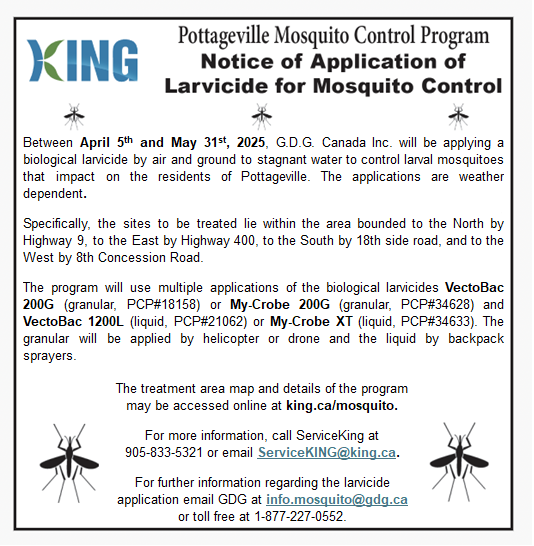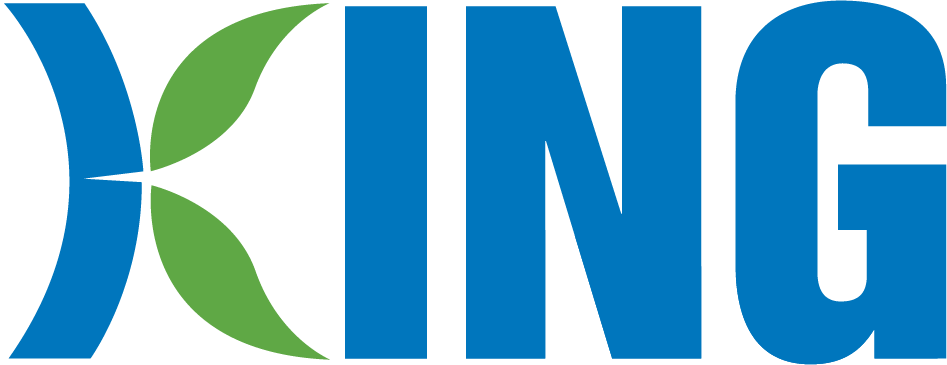Pottageville Mosquito Control Program Information Guide
This Information Guide has been provided by Township of King Public Works Department to explain the Mosquito Control Program and to provide answers to commonly asked questions.
The Pottageville Mosquito Control Program aims to reduce the nuisance biting activity of the Spring Aedes mosquitoes, which are abundant during the spring months.
Click here to view the Pottageville Treatment Area Map.

The Nature of Pottageville
Much of Pottageville is located within a low-lying eco-system – a wetland complex that supports a wide variety of creatures and plant life. This environment also happens to be ideal for supporting many mosquito breeding sites, especially during the spring and summer.
History of the Program
The program originated as a private initiative by local residents in the early 90s. In 2004, the Township of King’s Council resolved to assume the program, with the first year of the Township's involvement in 2005. Long-time residents report that outdoor life has become more enjoyable since the program's implementation.
This is Not a West Nile Virus Program
The focus of the Pottageville Mosquito Control Program is to reduce the nuisance biting activity of Spring Aedes mosquitoes, which are abundant during the spring months. These mosquitoes are not known to be vectors for West Nile Virus (WNV). A vector is an organism that transmits disease from one host to another. For WNV, the infection is transmitted by specific mosquito species.
For more information on mosquitoes that can carry WNV, please contact the Regional Municipality of York Public Health Unit at 1-800-361-5653.
Treatment Details
- Timing: Licensed applicators monitor breeding sites in early April. Treatment takes place in April and/or May when mosquito larvae are at the optimal stage for control.
- Method: A biological larvicide is applied to stagnant water in main breeding sites using helicopters, drones, and ground sprayers.
- Products Used: The program may use any of the following larvicides:
- VectoBac 200G (granular, PCP#18158)
- My-Crobe 200G (granular, PCP#34628)
- VectoBac 1200L (liquid, PCP#21062)
- My-Crobe XT (liquid, PCP#34633)
- Application Process: When the mosquito larvae reach the optimal treatment stage, larvicide is applied by air via helicopter and drone, additionally ground application is completed by backpack-sprayers. This is conducted over a few days, depending on weather conditions.
Your Own Backyard
One tire, thrown away in a backyard will hold enough water in its rim to breed 100,000 mosquitoes during April. To ensure a truly effective program, early spring cleanup is necessary. Residents must eliminate potential breeding sites in their yards through sanitation and maintenance. Clean or remove poorly maintained pools, wading pools, old tires, rain barrels, troughs and other similar containers that collect rainwater and create perfect breeding sites for mosquitoes.
Regulatory Compliance
To ensure that all precautions as prescribed by the Ministry of Environment, Conservation and Parks (MECP) are followed, the Township of King contracts the services of an experienced licensed applicator to carry out the monitoring and larviciding activities. The contractor must obtain its license from the MECP. In addition, licensed applicators must apply annually to the MECP for a permit to apply larvicide. As a condition of the permit, the licensed applicator is required to monitor and document the before and after results of the application and then file a report to the MECP for their review and approval. A copy of this report is also provided to the Township.
Another condition of this permit is that the applicator must send a letter via Canada Post informing the property owners prior to applying the treatment.
Expected Results
Do not expect 100 percent elimination of the mosquitoes as a result of the control program. The goal is to reduce the biting activity to a tolerable level. There are several species of mosquitoes found in Pottageville that subsist throughout the summer season.
Spring weather conditions also play a significant role in the efficacy of the program, which again, targets only the Spring Aedes mosquito. Remember, this is a single application that may be conducted over a couple of days in the month of April and/or May. Excess rainfall after the application can easily facilitate a second hatch. As a result, residents will find that the level of success of this program can vary from year to year.
Finally, it’s not hundreds of thousands of mosquitoes we’re dealing with, but millions that thrive in this vibrant eco-system – the presence of which supports many important creatures such as bats and the Purple Martin.
Notice of Aerial Larvicide Application
The MECP does not require property owners' authorization for this program. The land owner's properties who fall within the mapped treatment area will receive a letter from the Township's contractor reminding them that they will be applying the larvicide to their property.
Program Inquiries can be made to:
Britany Hodge
Environmental Infrastructure and Compliance Supervisor
E-mail: bhodge@king.ca
